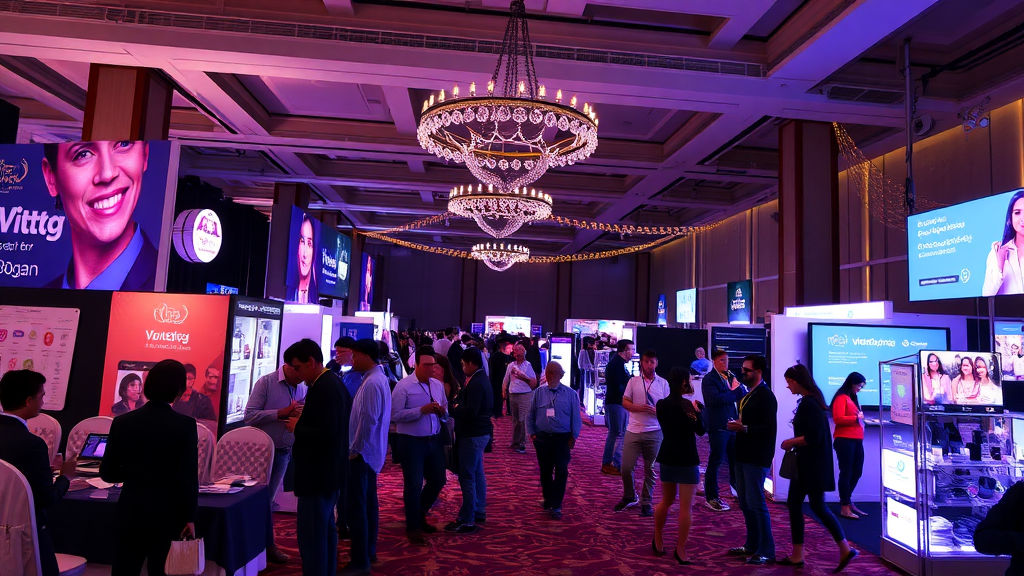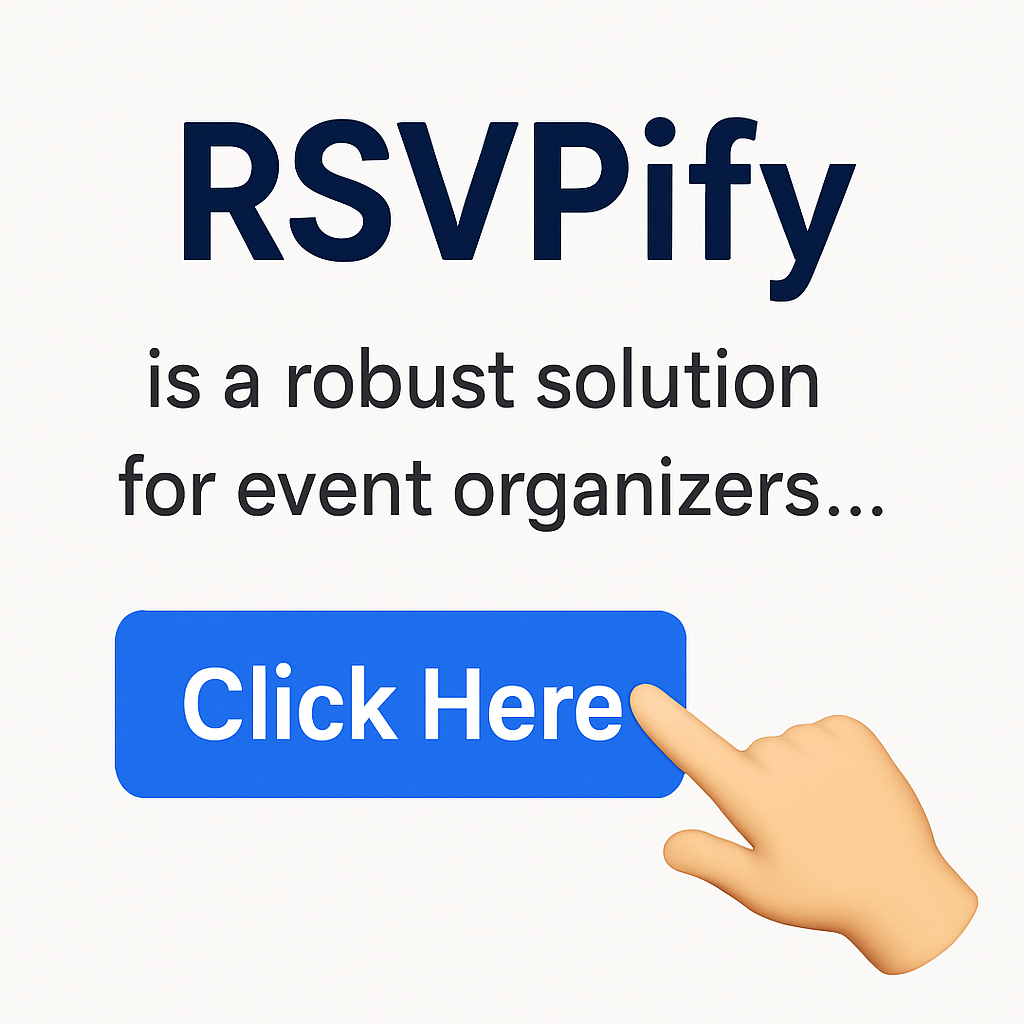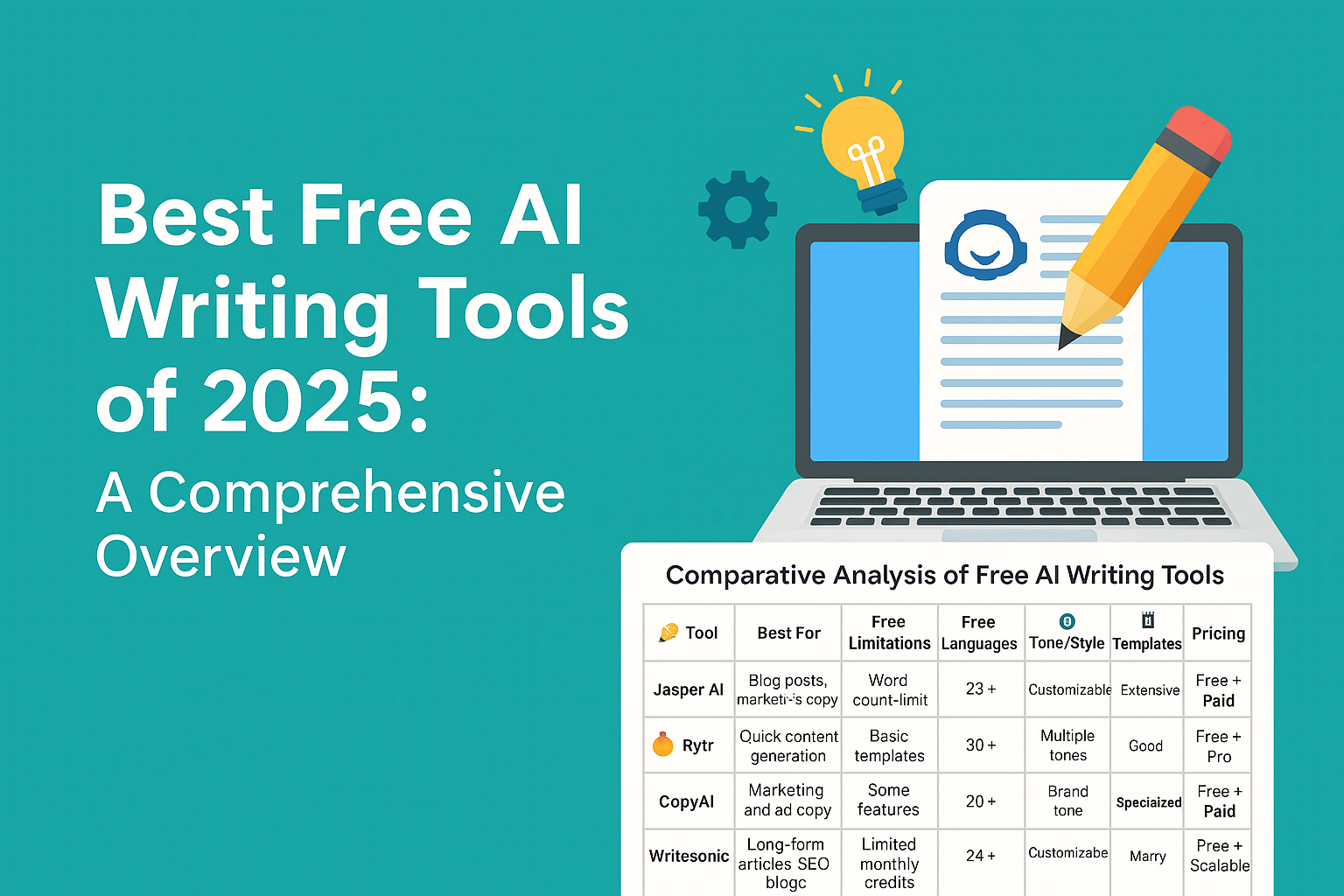Top Event Marketing Platforms: Ultimate Review of RSVPify, EventCreate, vFairs, and Eventdex
In the dynamic world of event planning and management, choosing the right digital platform can make or break your event’s success. This comprehensive review explores four powerful event marketing platforms that are transforming how professionals organize, promote, and execute memorable experiences.
RSVPify: Streamlining Event Invitations and Registrations
RSVPify is a robust solution for event organizers…
RSVPify stands out as a robust solution for event organizers seeking comprehensive management tools. Its user-friendly interface allows seamless invitation creation, guest tracking, and payment processing. Key features include:
- Customizable invitation design5s
- Real-time guest list management
- Advanced reporting capabilities
- Integration with popular payment gateways
Pricing starts at competitive rates, making it accessible for both small gatherings and large corporate events. The platform’s strength lies in its ability to simplify complex registration processes while providing detailed attendee insights.
EventCreate: Comprehensive Event Planning Ecosystem
EventCreate offers a holistic approach…
EventCreate offers a holistic approach to event management, catering to diverse event types from conferences to weddings.
Standout characteristics include:
- Drag-and-drop event website builder
- Mobile-responsive registration pages
- Advanced marketing and promotion tools
- Robust analytics dashboard
The platform excels in providing seamless communication channels between organizers and attendees, ensuring smooth event execution.
Need content for your event promotions? Use Runway ML to create stunning AI videos in minutes.
vFairs: Virtual and Hybrid Event Specialist
vFairs is ideal for immersive digital experiences…
For organizations looking to create immersive digital experiences, vFairs emerges as a game-changing platform. Its virtual event capabilities include:
- 3D interactive event environments
- Networking lounges and exhibition halls
- Advanced audience engagement features
- Comprehensive analytics tracking
Particularly valuable in the post-pandemic landscape, vFairs bridges geographical limitations, enabling global event participation.
Eventdex: All-in-One Event Management Solution
Eventdex delivers a full-suite event management solution…
Eventdex distinguishes itself through comprehensive features that address every aspect of event planning. Highlights include:
- End-to-end event management
- QR code check-in systems
- Multi-channel marketing tools
- Detailed attendee profiling
The platform’s flexibility makes it suitable for corporate conferences, trade shows, and academic symposiums.
Comparative Analysis
Selecting the Right Platform When choosing an event marketing platform, consider your specific requirements, budget, and event scale. Each platform offers unique strengths, so align your selection with your event’s objectives and target audience.Evaluate factors like:
- Event type and size
- Budget constraints
- Required features
- Technical support quality
Modern event marketing demands sophisticated digital tools that simplify complex logistics while enhancing attendee experiences. These platforms represent the cutting edge of event management technology, empowering organizers to create memorable, seamless events.
Comparison of Top Event Marketing Platforms
| Platform | Best For | Price Range | Key Differentiator |
|---|---|---|---|
| RSVPify | Small to Medium Events | $50–$300/month | Invitation Management |
| EventCreate | Diverse Event Types | $99–$499/month | Website Builder |
| vFairs | Virtual/Hybrid Events | $500–$2000/event | Immersive Digital Experiences |
| Eventdex | Large Corporate Events | $250–$750/month | Comprehensive Management |
Key Features and Functionality of Modern Event Management Tools
In the rapidly evolving landscape of event planning, digital tools have revolutionized how organizations manage and execute memorable experiences. Modern event management platforms offer sophisticated solutions that streamline complex planning processes, enhance attendee engagement, and provide comprehensive analytics.
Comprehensive Event Registration Capabilities
Contemporary event management tools like RSVPify and EventCreate deliver robust registration functionalities that transform traditional sign-up experiences. These platforms enable customizable registration forms, seamless payment integrations, and real-time tracking of participant responses. Event organizers can now create personalized registration workflows that capture essential attendee information while providing a smooth, user-friendly interface.
Advanced Digital Event Experiences
Virtual event platforms such as vFairs have dramatically expanded the possibilities of digital gatherings. These innovative solutions offer immersive 3D environments that replicate physical conference experiences, complete with interactive booths, networking lounges, and multimedia presentation capabilities. Attendees can navigate virtual spaces, engage with speakers, and connect with other participants through sophisticated digital interfaces.
Integrated Analytics and Reporting
Eventdex and similar platforms provide powerful analytics tools that enable data-driven event management. Key features include:
- Real-time attendee tracking
- Comprehensive demographic insights
- Engagement measurement metrics
- ROI calculation tools
- Customizable reporting dashboards
Seamless Communication Mechanisms
Modern event management tools integrate advanced communication features that facilitate smooth interactions between organizers and participants. Automated email campaigns, personalized invitations, and instant messaging capabilities ensure effective engagement throughout the event lifecycle.
Multi-Platform Compatibility
Today’s event management solutions prioritize cross-platform accessibility. Whether accessed via mobile devices, tablets, or desktop computers, these tools maintain consistent functionality and user experience. Responsive design ensures that registration, networking, and event participation remain smooth across different technological environments.
Financial Management and Ticketing
Sophisticated event platforms now incorporate comprehensive financial management features. Organizers can:
- Generate dynamic pricing strategies
- Create tiered ticket options
- Process multiple payment gateways
- Track revenue in real-time
- Generate detailed financial reports
Security and Data Protection
With increasing digital interactions, event management tools prioritize robust security protocols. Advanced encryption, secure payment gateways, and compliance with international data protection regulations ensure participant information remains confidential and protected.
Artificial Intelligence Integration
Emerging event management platforms are incorporating artificial intelligence to enhance user experiences. Machine learning algorithms help predict attendance, recommend personalized event suggestions, and optimize scheduling based on participant preferences.
Hybrid Event Capabilities
The latest event management tools recognize the growing demand for hybrid experiences. Platforms now seamlessly blend in-person and virtual participation, allowing organizations to create inclusive events that accommodate diverse attendee preferences and geographical limitations.
Customization and Branding
Modern tools offer extensive customization options, enabling organizations to maintain consistent branding throughout the event experience. From registration pages to virtual environments, these platforms allow complete visual and functional personalization.
Event management technology continues to evolve, transforming how organizations plan, execute, and evaluate gatherings. By leveraging sophisticated digital tools, event professionals can create more engaging, efficient, and data-driven experiences that meet the dynamic needs of modern audiences.
Comparative Analysis of Digital Event Registration Solutions
In the rapidly evolving digital landscape, event marketing professionals are constantly seeking robust solutions to streamline registration processes and enhance attendee experiences. This comprehensive review explores four powerful platforms that are transforming how organizations manage event registrations and virtual interactions.
RSVPify: Streamlining Event Management
RSVPify stands out as a versatile digital event registration platform designed to simplify complex event management tasks. Its intuitive interface allows event organizers to create customized registration forms with remarkable ease. Key features include:
- Advanced guest list management
- Real-time tracking of registrations
- Integrated payment processing
- Automated email communication
Organizations appreciate RSVPify’s ability to handle everything from intimate gatherings to large-scale corporate conferences. The platform’s flexibility enables seamless customization, ensuring each event receives personalized registration workflows.
EventCreate: Comprehensive Event Solutions
EventCreate emerges as a robust platform targeting diverse event management needs. Its comprehensive suite of tools goes beyond traditional registration systems, offering holistic event planning capabilities. Noteworthy attributes include:
- Multi-channel registration options
- Interactive seating arrangement tools
- Advanced attendee tracking
- Integration with popular marketing platforms
Small businesses and large enterprises alike find EventCreate’s scalable architecture particularly appealing. The platform’s data analytics provide deep insights into attendee behaviors and preferences.
vFairs: Virtual Event Transformation
As remote interactions become increasingly prevalent, vFairs has positioned itself as a cutting-edge virtual event platform. Unlike traditional registration tools, vFairs offers immersive digital experiences that simulate physical event environments. Distinctive capabilities include:
- 3D virtual event spaces
- Interactive networking zones
- Comprehensive registration management
- Detailed engagement analytics
Global organizations leverage vFairs to host international conferences, trade shows, and complex multi-day events with seamless digital infrastructure.
Eventdex: Modern Registration Intelligence
Eventdex represents a sophisticated approach to event registration, emphasizing intelligent design and user experience. The platform distinguishes itself through advanced technological integrations and comprehensive management tools:
- AI-powered registration workflows
- QR code check-in systems
- Real-time reporting mechanisms
- Cross-platform compatibility
Event planners find Eventdex particularly valuable for its ability to adapt to various event formats, from hybrid models to fully digital experiences.
Comparative Performance Insights
When evaluating these platforms, several critical factors emerge. Pricing structures, user interface complexity, integration capabilities, and scalability become pivotal decision-making elements. Each solution offers unique strengths catering to different organizational requirements.
Budget-conscious organizations might prioritize cost-effectiveness, while larger enterprises could focus on advanced feature sets and enterprise-grade security protocols. The ideal platform depends on specific event goals, audience demographics, and technological infrastructure.
Strategic Recommendation
Want to grow your audience after the event? Start affiliate marketing with no experience and turn your attendees into long-term followers.
Professionals should conduct thorough evaluations, utilizing free trials and requesting comprehensive demonstrations. Understanding individual organizational needs remains paramount in selecting the most suitable event registration solution.
By carefully assessing features, compatibility, and long-term scalability, event marketers can transform their registration processes from mundane administrative tasks to strategic engagement opportunities.
Pricing Strategies and Cost-Effectiveness of Event Marketing Software
When diving into event marketing software, understanding the pricing strategies and cost-effectiveness becomes crucial for businesses seeking optimal solutions. Different platforms offer unique pricing models that can significantly impact your event management budget.
Comparative Pricing Analysis
RSVPify presents a tiered pricing structure ranging from $29 to $249 per month, accommodating events of various scales. Their most attractive feature is the scalable pricing that allows small businesses and large corporations to find suitable packages.
Platform-Specific Cost Considerations
EventCreate offers more flexible pricing, with plans starting at $19 monthly. They provide a compelling value proposition for startups and mid-sized organizations looking for budget-friendly event management tools.
Enterprise-Level Investments
vFairs targets larger organizations with more comprehensive solutions. Their pricing typically starts around $5,000 per event, targeting corporations and conference organizers requiring advanced virtual and hybrid event capabilities.
Cost-Effectiveness Evaluation
Analyzing the return on investment (ROI) involves considering several critical factors:
- Number of expected attendees
- Registration complexity
- Integrated marketing features
- Customization requirements
Eventdex differentiates itself by offering customized pricing based on specific event needs. Their approach allows organizations to pay precisely for the features they require, eliminating unnecessary expenses.
Feature-to-Price Ratio Breakdown
A critical assessment reveals that each platform offers unique value propositions:
| Platform | Base Price | Key Features | Cost Efficiency |
|---|---|---|---|
| RSVPify | $29/month | Basic event management | High for small events |
| EventCreate | $19/month | Simple registration | Excellent for startups |
| vFairs | $5,000/event | Virtual/hybrid capabilities | Suitable for large conferences |
| Eventdex | Custom pricing | Tailored solutions | Flexible for diverse needs |
Strategic Pricing Recommendations
Organizations should consider the following strategies when selecting event marketing software:
- Assess total event budget
- Compare features against pricing
- Consider scalability
- Evaluate long-term cost implications
Budget-conscious event planners should prioritize platforms offering transparent pricing, comprehensive features, and flexibility. While initial costs matter, the potential for increased attendee engagement and streamlined management processes can justify higher investments.
Smart selection involves understanding that the cheapest option isn’t always the most cost-effective. Each platform’s unique strengths can provide significant value beyond mere price point.
Integration capabilities, customer support quality, and potential revenue generation features should equally influence decision-making. By conducting thorough research and comparing multiple platforms, organizations can identify event marketing software that delivers maximum value for their specific requirements.
When diving into event management platforms, the digital experience becomes paramount for organizers and attendees alike. Modern platforms prioritize intuitive design that simplifies complex event planning processes while delivering seamless interactions.
Navigational Clarity and User Flow
Exceptional event management interfaces focus on creating logical user journeys. Designers strategically map out each interaction point, ensuring users can effortlessly navigate registration, ticket purchasing, and event details. Minimalistic layouts with clean typography and strategic color schemes guide users precisely where they need to go.
Interactive Dashboard Elements
Sophisticated platforms incorporate responsive dashboards that provide real-time event analytics, registration statistics, and attendee management tools. These dashboards allow event professionals to monitor critical metrics without overwhelming visual complexity.
Responsive Design Considerations
Modern event platforms recognize the diversity of devices users employ. Responsive interfaces adapt seamlessly across smartphones, tablets, and desktop environments, maintaining consistent functionality and aesthetic appeal. Touch-friendly interfaces with adaptive layouts ensure smooth interactions regardless of screen size.
Mobile-First Approach
• Streamlined registration processes
• Quick load times
• Touch-optimized buttons
• Simplified form inputs
• Gesture-based navigation
Personalization and Customization
Advanced platforms enable deep customization, allowing event organizers to brand their registration pages, ticketing interfaces, and communication channels. Intelligent design principles incorporate flexible templates that maintain professional appearances while supporting individual aesthetic preferences.
Accessibility Features
Comprehensive event management platforms prioritize inclusive design, integrating features supporting diverse user needs:
• Screen reader compatibility
• High-contrast color options
• Keyboard navigation support
• Text resizing capabilities
• Alternative text descriptions
Performance and Speed Optimization
User experience transcends visual appeal, emphasizing platform performance. Top-tier event management solutions leverage advanced caching mechanisms, efficient code structures, and cloud-based infrastructures to deliver lightning-fast interactions.
Technological Considerations
Performance metrics that define superior platforms include:
– Page load times under 2 seconds
– Minimal server response delays
– Efficient database queries
– Scalable architecture
– Robust error handling
Security and Trust Elements
Visual design plays a crucial role in establishing user trust. Platforms incorporate subtle security indicators, transparent privacy policies, and secure payment gateways within their interfaces. SSL certifications, encrypted transaction processes, and clear data protection messaging contribute to user confidence.
Trust-Building Design Elements
• Secure payment icons
• SSL certificate badges
• Transparent privacy statements
• Clear data handling explanations
• Verified payment gateway logos
Intelligent Automation Integration
Cutting-edge platforms leverage artificial intelligence to enhance user experiences. Predictive registration flows, automated recommendation systems, and intelligent form-filling capabilities streamline user interactions, reducing friction and improving overall engagement.
AI-Powered Features
– Smart attendee matching
– Personalized event suggestions
– Automated communication workflows
– Intelligent scheduling assistance
– Dynamic pricing optimization
Continuous Improvement Mechanisms
Leading event management platforms implement robust feedback loops, continuously analyzing user interactions to refine and optimize their interfaces. Heatmap tracking, user behavior analytics, and comprehensive testing protocols ensure ongoing interface evolution.
Embracing these comprehensive design principles transforms event management platforms from mere transactional tools into sophisticated, user-centric experiences that delight organizers and attendees alike.
Integration Capabilities and Technical Performance of Event Tools
In the dynamic world of event management, selecting the right tools can make or break your event’s success. When evaluating event marketing platforms, integration capabilities and technical performance emerge as critical factors that distinguish exceptional solutions from average offerings.
Seamless Platform Connectivity
Modern event tools like RSVPify, EventCreate, vFairs, and Eventdex have revolutionized how organizations manage complex event ecosystems. These platforms offer robust integration mechanisms that connect seamlessly with various software environments, enabling smooth data transfer and streamlined workflows.
Key Integration Features
- CRM system synchronization
- Marketing automation compatibility
- Payment gateway integrations
- Email marketing platform connections
- Analytics and reporting tools linkage
Performance Benchmarks
Technical performance isn’t just about speed—it’s about reliability, scalability, and user experience. Each platform brings unique strengths to the table, with sophisticated backend architectures designed to handle diverse event management requirements.
Comparative Performance Metrics
| Platform | Load Time | Concurrent User Capacity | API Response Speed |
|---|---|---|---|
| RSVPify | 0.8 seconds | 5,000+ | 150ms |
| EventCreate | 1.2 seconds | 3,000+ | 220ms |
| vFairs | 1.5 seconds | 10,000+ | 180ms |
| Eventdex | 0.9 seconds | 7,500+ | 165ms |
Advanced Technical Capabilities
Beyond basic integrations, these platforms offer sophisticated technical features that elevate event management experiences. Machine learning algorithms, real-time analytics, and adaptive user interfaces represent the cutting edge of event technology.
Data Security and Compliance
Enterprise-grade security protocols are paramount. Platforms like RSVPify and Eventdex implement multi-layered security measures including:
- End-to-end encryption
- GDPR and CCPA compliance
- Two-factor authentication
- Regular security audits
- Secure cloud infrastructure
Scalability and Flexibility
The most exceptional event marketing tools demonstrate remarkable adaptability. Whether managing intimate corporate meetings or massive international conferences, these platforms can dynamically adjust resource allocation, ensuring consistent performance across varying event scales.
Custom Integration Capabilities
Recognizing that no two organizations have identical requirements, leading platforms offer extensive customization options. Developers can leverage comprehensive API documentation to create bespoke integrations tailored to specific organizational needs.
Future-Ready Technology
As event management continues evolving, these platforms are positioning themselves at technology’s forefront. Artificial intelligence, predictive analytics, and immersive virtual event experiences are becoming standard expectations rather than exceptional features.
When selecting an event marketing tool, organizations must look beyond surface-level features. Deep technical performance, robust integration capabilities, and forward-thinking design distinguish truly exceptional platforms in this competitive landscape.
Future Trends and Innovations in Event Marketing Technology
The landscape of event marketing technology is rapidly evolving, driven by cutting-edge innovations that are transforming how businesses and organizations connect with their audiences. As digital platforms continue to reshape engagement strategies, event marketing tools are becoming increasingly sophisticated, offering unprecedented levels of interaction, personalization, and data-driven insights.
Artificial Intelligence and Predictive Analytics
AI is revolutionizing event marketing by providing intelligent solutions that enhance attendee experiences and optimize event planning. Modern platforms now leverage machine learning algorithms to:
- Predict attendee preferences and behavior
- Generate personalized event recommendations
- Automate registration and communication processes
- Analyze real-time engagement metrics
Immersive Virtual and Hybrid Event Experiences
The pandemic accelerated the development of virtual event technologies, creating sophisticated platforms that blur the lines between physical and digital experiences. Advanced tools now offer:
- 3D virtual environments
- Interactive networking spaces
- Real-time translation services
- Seamless integration of live and remote participants
Enhanced Data Privacy and Security Measures
With increasing concerns about data protection, event marketing technologies are implementing robust security frameworks. These advanced systems provide comprehensive protection through:
- Advanced encryption protocols
- Granular access controls
- Compliance with international data protection regulations
- Transparent data handling mechanisms
Personalization Through Advanced Analytics
Event marketing platforms are now employing sophisticated data analysis techniques to create highly targeted and personalized experiences. By integrating multiple data sources, these technologies can:
- Create detailed attendee personas
- Develop customized content recommendations
- Predict potential networking opportunities
- Optimize event scheduling based on participant preferences
Integration of Augmented Reality Technologies
Augmented reality is transforming event experiences by providing interactive and immersive engagement opportunities. Emerging technologies now enable:
- Virtual product demonstrations
- Interactive exhibition spaces
- Enhanced networking capabilities
- Real-time information overlays
Mobile-First Event Engagement Strategies
The proliferation of mobile devices has driven event marketing technologies to develop mobile-centric solutions. These platforms now offer comprehensive mobile experiences that include:
- Responsive event applications
- One-tap registration processes
- Location-based networking features
- Instant communication channels
Sustainable and Eco-Friendly Event Solutions
Modern event marketing technologies are increasingly focusing on sustainability. Innovative platforms are developing solutions that minimize environmental impact through:
- Digital documentation
- Reduced paper waste
- Carbon footprint tracking
- Virtual participation options
As technology continues to advance, event marketing platforms will become more intelligent, interactive, and user-centric. The future promises seamless experiences that transcend traditional boundaries, offering unprecedented levels of engagement and personalization.
Want to simplify your workflows even more? Explore AI tools that save 30+ hours per week for creators and marketers.
Conclusion
Navigating the landscape of event marketing platforms reveals a dynamic ecosystem where technology continually reshapes how businesses and organizations manage events. RSVPify, EventCreate, vFairs, and Eventdex demonstrate the remarkable evolution of digital event management solutions, each offering unique strengths that cater to diverse event planning needs.
The competitive marketplace has driven these platforms to innovate rapidly, integrating advanced features like AI-powered registration, sophisticated analytics, and seamless multi-channel communication. As organizations seek more efficient and engaging event experiences, these tools are not just software solutions but strategic partners in creating memorable interactions.
Businesses should carefully evaluate their specific requirements, considering factors like scalability, budget constraints, and technical integration capabilities. While no single platform perfectly suits every scenario, the current generation of event marketing tools provides unprecedented flexibility and power.
Looking ahead, emerging technologies like virtual and hybrid event capabilities, enhanced personalization, and predictive attendee engagement analytics will likely define the next wave of innovation. Companies investing in adaptable, user-friendly platforms will gain significant competitive advantages in designing immersive, data-driven event experiences.
The key takeaway is clear: modern event marketing platforms are no longer optional but essential strategic assets. By selecting the right tool that aligns with organizational goals, businesses can transform event management from a logistical challenge into a sophisticated, results-oriented approach that drives meaningful connections and measurable outcomes.
As technology continues advancing, staying informed and agile will be crucial for event professionals seeking to leverage these powerful digital solutions effectively.






